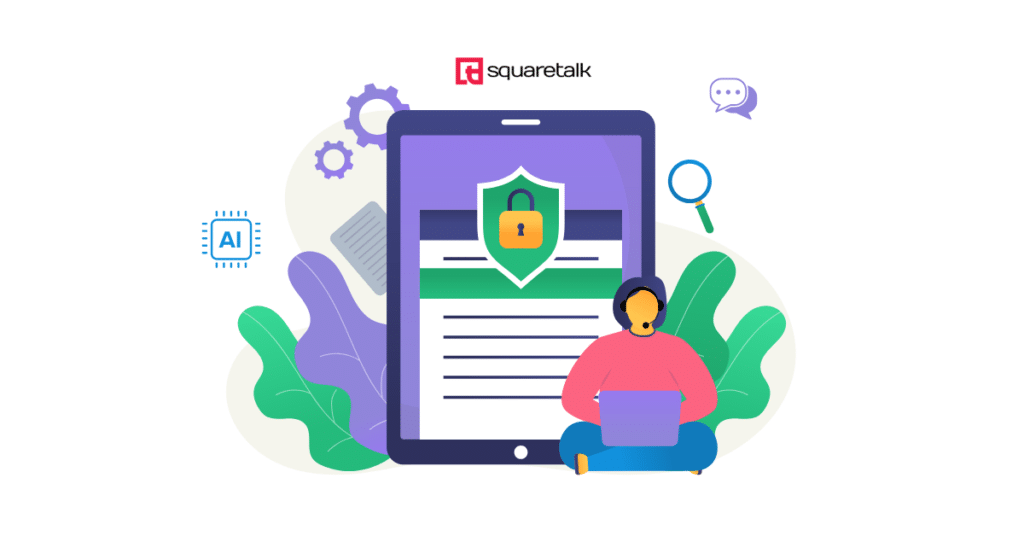The growing reliance on communication technology in call centers and contact center as a service (CCaaS) businesses underscores the need for robust data security measures. As these systems handle sensitive customer interactions and confidential business information, the risk of data breaches and cyber threats escalates. Data security is crucial in safeguarding customer trust, ensuring regulatory compliance, and protecting an organization’s reputation.
According to a recent survey, over 80% of consumers would stop patronizing a company after a data breach and leak. This statistic highlights the growing demand for clear and accessible privacy policies that can significantly enhance consumer confidence.
For businesses large and small, an effective cybersecurity system is necessary to defend against the many threats modern organizations face. The number of agents at a call center isn’t a deciding factor in data protection — no matter what, you’re going to need a few layers of security to ensure valuable data doesn’t get into the wrong hands and can’t be used against you.
The Risks of Inadequate Data Security in Call Centers and CCaaS
Inadequate data security in call centers and CCaaS can expose businesses to many cyber threats, leading to potentially devastating data breaches that compromise customer trust and sensitive information.
Non-compliance to data security regulations in call centers can have severe consequences, including hefty legal penalties and fines. ViSalus’ lawsuit led to $925 million in damages for TCPA violations. Additionally, operational disruptions can occur, reducing productivity and potentially resulting in reputational damage due to mishandling of customer information.
Threat Landscape
Data breaches have become increasingly common in recent years, with organizations across various industries facing cyberattacks and security vulnerabilities. The rise in digitalization, reliance on cloud services, and an increase in remote work have expanded the potential attack surface for cybercriminals. As technology continues to advance, so do the tactics used by hackers, making it difficult for businesses to stay ahead of potential threats.
They may include:
- Phishing attacks: These deceptive emails or messages are designed to trick employees into revealing sensitive information, such as login credentials.
- Social engineering: Many cybercriminals contact employees and attempt to deceive them into giving up sensitive information, such as passwords or security system details.
- Ransomware: This type of malicious software encrypts data, rendering it inaccessible until a ransom is paid, disrupting operations significantly.
- DDoS attacks: Distributed denial of service attacks overwhelm systems with traffic, causing downtime and hindering customer service.
Understanding these threats is essential for establishing effective data security measures and protecting business integrity. By knowing, you can devise a versatile shield to fight off data breaches.
Consequences of Data Breaches
Data breaches can lead to significant financial losses, including fines, recovery costs, and lost revenue due to customer churn. Reputational damage can erode trust, decreasing customer loyalty and market share. Legal repercussions often involve lawsuits and regulatory penalties.
Security is further complicated by many call center agents using vulnerable networks or personal devices when working from home. Data protection in remote work environments includes using VPNs, conducting regular training on cyber threats, and enforcing strict access controls.
Key Components of Data Security in Call Center Communication Systems
Encryption, access control, authentication, regular software updates, and patching are the most crucial elements for keeping call centers secure. These elements safeguard sensitive information and maintain robust security protocols.
Encryption
Encryption secures sensitive customer information by converting it into an unreadable format, which can only be decrypted with the correct key. This keeps the data safe even if accessed by an unauthorized party.
By implementing strong encryption protocols, call centers protect confidential information, maintaining customer trust and compliance with data protection regulations. Regular updates and advanced encryption standards further enhance the security of these communications, safeguarding both the business and its customers.
Authentication and Access Control
Multi-factor authentication (MFA) and strict access control are vital for enhancing data security in business communication systems. MFA requires users to verify their identity using more than just a password, such as through emails, texts, or phone calls. Should employees forget their password, they must contact management or IT for recovery.
Strict access control ensures that only authorized personnel can access sensitive customer and business data, minimizing the potential for data breaches.
Regular Updates and Patching
Software updates and patching are crucial for call centers and CCaaS businesses to safeguard against security vulnerabilities. Cyber attackers continuously seek to exploit outdated systems and software, which can lead to data breaches and compromised customer information.
By consistently applying updates and security patches, organizations can close loopholes, enhance their defenses against emerging threats, and ensure compliance with industry standards. This proactive approach protects sensitive data and helps maintain customer trust and the business’s overall reputation in a competitive environment.
Best Practices for Enhancing Data Security in Call Centers and CCaaS
Following best practices for data security in call centers and CCaaS businesses is essential to protecting sensitive customer information, preventing data breaches, and maintaining operational integrity.
Employee Training and Awareness
Employees must be continuously trained on security protocols to safeguard customer information. Regular training sessions, workshops, and simulations can help staff recognize potential threats, such as phishing attacks or social engineering. Incorporating interactive e-learning modules can enhance understanding and retention of security practices.
Additionally, establishing a culture of security awareness through internal newsletters on the latest exploits, vulnerabilities, and cybersecurity protocols can keep employees informed about evolving threats. Equipping staff with the knowledge and skills to handle customer information safely protects sensitive data and reinforces trust between the business and its clients.
Implementing Robust Security Policies
Comprehensive security policies, including incident response plans, are vital for call centers to manage security incidents effectively. These policies outline clear protocols for identifying, responding to, and recovering from breaches, minimizing potential damage.
Well-structured security policies and certifications like ISO 27001 instill confidence in customers and ensure that their sensitive data is protected and handled responsibly.
Conclusion
Prioritizing data security in call centers and CCaaS safeguards sensitive customer information, maintains compliance, and builds trust. Businesses can prevent data breaches and enhance their reputation by implementing robust security policies and ongoing employee training.
Organizations must regularly assess security measures and adopt proactive strategies to protect customer data and ensure seamless business continuity. Take action now — review your security protocols and invest in training to fortify your defenses against emerging threats.
FAQ
Why is data security crucial in CCaaS platforms?
What are the common threats to data security in CCaaS environments?
- Unauthorized access to cloud systems
- Insecure APIs or integrations
- Weak authentication methods
- Misconfigured cloud settings leading to vulnerabilities
- Phishing and malware attacks targeting cloud credentials
How can businesses mitigate data security risks in their contact centers?
- Implementing robust identity and access management
- conducting regular security training for employees
- Ensuring encryption of all sensitive data
- Regularly updating and patching software and systems
- Continuously monitoring for suspicious activities
What are the consequences of non-compliance with data security regulations?
How does robust data security benefit customer relationships?

Ainsley Lawrence
Ainsley Lawrence is a freelance writer who lives in the Northwest region of the United States. She has a particular interest in covering topics related to tech and cybersecurity. When not writing, her free time is spent reading and researching to learn more about her cultural and environmental surroundings. You can follow her on Twitter @AinsleyLawrenc3








